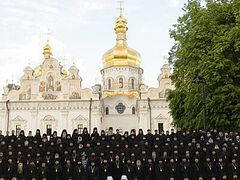Kiev, October 2, 2024
 The latest report from the UN’s Office of the High Commissioner for Human Rights (OHCHR) on the human rights situation in Ukraine is again raising awareness about the persecution of the Ukrainian Orthodox Church.
The latest report from the UN’s Office of the High Commissioner for Human Rights (OHCHR) on the human rights situation in Ukraine is again raising awareness about the persecution of the Ukrainian Orthodox Church.
The UN has continually sounded the alarm about the persecution of the UOC. His Eminence Metropolitan Theodosy of Cherkasy, one of the hierarchs being specifically targeted by the Ukrainian state, has addressed the Human Rights Council on the matter several times.
The UN’s latest report covers the period from June 1 to August 31, 2024. It refers to specific cases of persecution against the Church, as well as the unconstitutional law aimed at banning the Orthodox Church throughout the country.
The report describes the unjustified banning of the Church in one local district:
In the reporting period, OHCHR continued to document cases impacting the activities of the Ukrainian Orthodox Church (UOC). On 17 June 2024, the Lviv Circuit Administrative court upheld a decision of the Drohobych city council to ban the activities of the UOC in the district due to national security considerations. The court held that the local UOC religious community had not proven a violation of its rights, without however sufficiently explaining how the ban was deemed necessary and proportional to protect public safety or order, as required by art. 18 of the International Covenant on Civil and Political Rights (ICCPR). OHCHR is aware of at least seven similar judgments since February 2022. Five of the decisions have become final, with no further possibility of appeal.
Regarding the elderly and sickly Metropolitan Jonathan of Tulchin, who was sentenced to five years’ imprisonment, the report states:
In another case, a high-level UOC clergyman was released to the Russian Federation during a prisoner exchange on 22 June. A day earlier, the Vinnytsia Court of Appeal had upheld a verdict of five years of imprisonment and confiscation of property for charges in relation to justification of the armed conflict. In both this and another case documented by OHCHR, UOC clergy members reported pressure to confess and agree to exchange with the Russian Federation.
Concerning the discriminatory law against the canonical Orthodox Church, the UN states:
On 20 August 2024, the Parliament of Ukraine adopted the law “On the protection of constitutional order in the sphere of activities of religious organizations” (Law No. 3894-IX), introducing legislative amendments which inter alia prohibit the activities in Ukraine of the Russian Orthodox Church, as well as other religious organizations affiliated with it. The Law also prohibits the activities of any religious organizations which are used for the “propaganda of the ideology of the Russian world”.
The Law raises concerns regarding its compliance with international human rights standards. In particular, it refers to national security as a ground for restrictions on the freedom of religion or belief and the freedom of religious associations. However, neither the ICCPR nor the European Convention on Human Rights include “national security” among the permissible grounds for such a restriction.
In the eyes of the Ukrainian state, the documents of the Russian Orthodox Church carry the force of law in terms of defining the status of the Ukrainian Orthodox Church. Thus, although the Ukrainian Church considers that it separated itself from the Russian Church more than two years, the Ukrainian state and the Russian Church share the same view, that the UOC remains part of the ROC.
Thus, while the law talks of banning the Russian Orthodox Church, it is openly admitted by politicians that it means banning the Ukrainian Orthodox Church.
Follow OrthoChristian on Twitter, Vkontakte, Telegram, WhatsApp, MeWe, and Gab!



